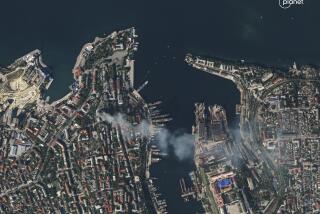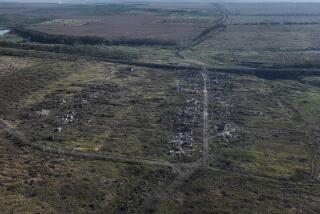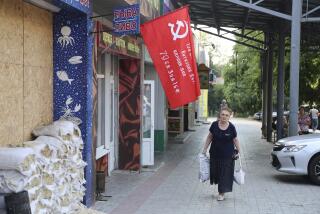Russia’s Crimea takeover breeding anarchy and fear throughout East
Russian President Vladimir Putin’s unimpeded success in annexing Crimea has inspired Russian nationalists in eastern Ukraine to seize territory and sown fear region-wide that such provocations will spur Moscow to intervene on behalf of ethnic Russians.
The occupation of government buildings in the Ukrainian cities of Donetsk, Lugansk and Kharkiv on Sunday mirrors what happened in Crimea, where Russian forces barricaded themselves in local authorities’ offices and demanded a referendum on whether to the peninsula should secede and join Russia.
But the architects of the latest secessionist moves won’t find such an easy path out of Ukraine as did their Crimean counterparts, analysts note.
Ethnic Russians and Russian speakers are a majority in Crimea, a strategic Black Sea peninsula that hosts Russian naval forces and was part of Russia for centuries before 1954, when Soviet leader Nikita S. Khrushchev transferred the territory to the Ukrainian Soviet Socialist Republic. Elsewhere in Ukraine, Russians constitute a minority and may face more resistance from their Ukrainian neighbors.
“What we’ve seen in eastern Ukraine is dueling protests. I think we will see more pushback there than in Crimea. A lot will depend on Russia’s actions, whether Russia exhibits any kind of restraint,” said Olga Oliker, associate director of Rand Corp.’s International Security and Defense Policy Center. “If you do have actual efforts to separate these areas from Ukraine, this will not be bloodless.”
Ukrainian security forces managed to oust the activists who seized the Kharkiv government building over the weekend, but the small bands of demonstrators occupying official buildings in Donetsk and Lugansk dug in Monday. Barbed wire and barriers of stacked tires now protect the militants from attempts by Ukrainian police to regain control, threatening a protracted and volatile standoff.
Pro-Russia militants failed Monday to take over the main television station in Donetsk, where shots were fired into the air by protesters and Ukrainian police, the Interfax news agency reported.
Russian media helped whip up support for the annexation of Crimea by portraying the Ukrainian leadership in Kiev as a threat to ethnic Russians, and Moscow-based television and radio broadcasts still reach well beyond Russian borders.
Two Baltic states announced Monday that they were suspending Russian state-run television. Latvia and Lithuania said they were cutting off RTR affiliates because distorted reporting on the Ukraine crisis appeared aimed at inciting “discord” among Russians in the former Soviet republics.
Ukrainian Prime Minister Arseny Yatsenyuk on Monday accused the Kremlin of trying to destabilize eastern Ukraine to create a pretext for intervention.
Moscow aims to turn the eastern and southern parts of Ukraine into “a territory of slavery under a Russian dictatorship,” Yatsenyuk said in a televised address after the confrontations in eastern cities.
Interim President Oleksandr Turchynov canceled a planned visit to Lithuania on Monday to meet with security officials. The law enforcement gathering authorized the use of “anti-terrorist measures” against armed separatists, a veiled threat to use force to oust the occupiers.
But Ukraine’s political leaders must move carefully in the charged environment that prevails in the country following the ouster in February of President Viktor Yanukovich, said Oliker. Any use of force to drive out the Russian gunmen could be cast by Moscow’s state-controlled media as evidence that ethnic Russians are in mortal danger from those who overthrew Yanukovich, now in exile in Russia.
Ukraine’s interim leaders have set a May 25 presidential election, a move Western analysts believe would undermine Putin’s claims that the current government is unelected and illegitimate.
“If they can hold it together until the election and there is a legitimate government in place, then the arguments against the interim government go away,” said Oliker. “But so far the smart money hasn’t been on Russian restraint.”
Walter Connor, a Boston University international relations professor, said the unrest unfolding in Ukraine appears to be following the blueprint of the Crimean crisis.
“The mob actions taking place in the eastern cities are not freelance nationalists,” Connor said. “They are groups ready to be organized and mobilized and in no sense unaware that they are doing the work of Russia.”
The United States, the European Union and the North Atlantic Treaty Organization are still in a phase of slow reaction to a crisis none had envisioned, Connor said. And that inaction has given Moscow latitude to disrupt the social order in Ukraine’s eastern cities with an aim of influencing or thwarting the upcoming election.
“Moscow likes a Ukraine that is internally disorganized, where people are arguing with one another, a Ukraine that can’t be decisive and can’t unify its forces in either a military or economic sense,” said Connor.
While the Kiev leadership risks being accused of brutality against the pro-Russia occupiers in Donetsk and Lugansk, “this is a time when they can’t put off making the hard decisions,” Connor said.
ALSO:
Rwanda makes great progress 20 years after genocide
Sounds detected might be from Malaysia Airlines Flight 370
Distraught Oscar Pistorius testifies at murder trial, apologizes
A foreign correspondent for 25 years, Carol J. Williams traveled to and reported from more than 80 countries in Europe, Asia, the Middle East and Latin America.
More to Read
Start your day right
Sign up for Essential California for news, features and recommendations from the L.A. Times and beyond in your inbox six days a week.
You may occasionally receive promotional content from the Los Angeles Times.







